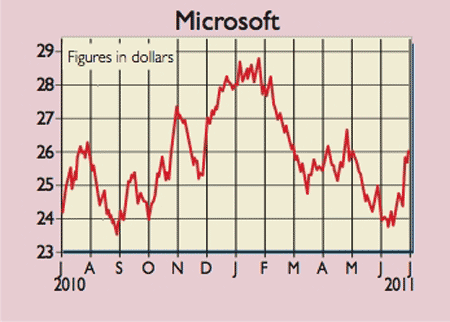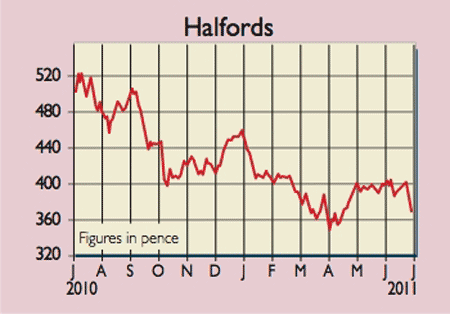Get the latest financial news, insights and expert analysis from our award-winning MoneyWeek team, to help you understand what really matters when it comes to your finances.
You are now subscribed
Your newsletter sign-up was successful
Want to add more newsletters?

Twice daily
MoneyWeek
Get the latest financial news, insights and expert analysis from our award-winning MoneyWeek team, to help you understand what really matters when it comes to your finances.

Four times a week
Look After My Bills
Sign up to our free money-saving newsletter, filled with the latest news and expert advice to help you find the best tips and deals for managing your bills. Start saving today!
1. Microsoft (Nasdaq: MSFT), rated a BUY by Credit Suisse
Today's tech investors seem to have been sucked into the frenzy surrounding social media. Valuations of internet darlings such as Facebook, Twitter, Groupon and LinkedIn have gone to the moon. So the best bargains lie elsewhere.
Enter Microsoft, the world's largest software developer. It sports a $210bn market capitisation, yet has been out of favour since its much criticised $8.5bn acquisition of Skype. However, I think the deal should help it in many ways by adding home videoconferencing to its XBox/Kinect platform and combining free telephony with its Office applications. Additionally, the firm is one of a handful of organisations that can fairly be described as money-printing machines. Microsoft trousered $8.7bn in operating cash flow in the last quarter alone. That was thanks largely to its dominant Windows operating system, which runs on 90% of all PCs, and is used by more than one billion people worldwide.
MoneyWeek
Subscribe to MoneyWeek today and get your first six magazine issues absolutely FREE

Sign up to Money Morning
Don't miss the latest investment and personal finances news, market analysis, plus money-saving tips with our free twice-daily newsletter
Don't miss the latest investment and personal finances news, market analysis, plus money-saving tips with our free twice-daily newsletter

Yet Wall Street has not noticed there's still juice left in the tank. For instance, over the past four quarters, the group has delivered double-digit top-line growth. That's thanks to software upgrades (eg, Windows 7) and the terrific Kinect system, which allows you to control games and so on with your body movements and has already sold 10 million units.
This could just be the start. Microsoft is also working on technology that will allow users to toggle seamlessly between computers, tablets, smartphones and gaming machines the holy grail of computing. To achieve this, it has recently made a transformational deal with Nokia to supply its next-generation mobile software, and provided Research In Motion, the maker of BlackBerries, with its Bing search engine. By 2015, research analysts IDC predict that Microsoft's wireless platform will overtake Apple's that would make it the No. 2 behind Google's Android.
Later in 2011, Microsoft plans to unveil its revolutionary tablet computer, and last week it took the wraps off Office 365, its flagship cloud-computing product. This includes the latest versions of Word, Outlook, Excel and Sharepoint all available over the web for $6 per user per month. The application is specifically targeted at smaller businesses (with under 100 staff) who prefer not to pay for upfront licences and hardware or do not have their own IT support staff.
Wall Street is forecasting sales and earnings per share for the year ending June 2012 of $74.3bn and $2.77 respectively. That puts the stock on a price/earnings (p/e) multiple of 9.5 and a yield of 2.5%. However, I value the firm on a ten times earnings before interest, tax and amortisation (EBITA) multiple. Adjusting for the pro forma $30bn cash pile gives an intrinsic worth of over $34 a share.
There are possible bugs. Competition (for example, from Google and Apple) is intense, although the indirect costs of switching for corporate clients (the costs of compatibility and retraining, for example) protect Microsoft to some extent. And Microsoft's online services unit, which runs the MSN web portal and the Bing search engine, lost $726m in the last quarter and clearly needs attention. The company is also exposed to the economic cycle, software piracy problems (in China, for example) and ongoing litigation and regulatory issues.
All the same, this defensive cash machine has many opportunities ahead of it. Credit Suisse has a target price of $36, with results out in late July.
Rating: BUY at $26
2. Halfords (LSE: HFD),rated a BUY by Peel Hunt
My wife has been badgering me to replace her 11-year-old Volvo. But we are watching the pennies and have decided to postpone any decision. Many families will be doing the same. So what does that mean for Halfords, the owner of 224 stores in Britain that offer MOTs, servicing and repairs for both the consumer and fleet market? In the short term, it looks as if thrifty consumers will cut back on discretionary repairs, especially those of a cosmetic kind. Indeed, this has already affected Halford's store sales of auto-parts and enhancements, such as fancy alloys, sat-navs and go-faster stripes.

More positively, though, the retailer reported last month that a later Easter and the recent warm weather had encouraged more people to buy its bikes, tents and camping equipment. And at a time when high-street rivals are struggling, a 0.8% rise in like-for-like revenues for the 9 weeks to 3 June was a decent result. Better still, more families are planning holidays in the UK, and the Olympics is only 12 months away good news for leisure goods. Halfords sells one in every three bicycles sold in the UK, and should therefore also benefit from sky-high oil prices, which are prompting commuters to cycle to work to save money.
On valuation grounds, the shares look compelling too. The City is penciling in turnover and earnings per share of £879m and 39p respectively for the year to June 2012. Halfords trades on a current year p/e of 9.6, with the added attraction of a 5.7% yield. The board's decision to lift the dividend by 10% reaffirms its confidence, and the balance sheet looks reasonable, with net debt of £103m in March a comfortable 0.7 times earnings before interest, tax, depreciation and amortisation (EBITDA).
Potential problems loom. Higher unemployment, rising taxes, competition (from supermarkets, for example) and increasing sourcing costs could all squeeze margins. And Halfords has been hit by the bankruptcy of Focus, the DIY retailer. In 1989 Halfords gave property guarantees to Focus's landlords, and will have to pay £7.5m in compensation. This is embarrassing, but not a mortal blow and doesn't affect the investment case. Using a ten times EBITA multiple and deducting debt, I estimate the firm is worth 440p a share. Halfords' strategy of cutting costs and expanding into counter-cyclical niches should help insulate it from the worst of any forthcoming slump. Peel Hunt has a target price of 480p and the next trading statement is scheduled for 2 August.
Rating: BUY at374p
Paul Hill writes a weekly share-tipping newsletter, Precision Guided Investments. See www.moneyweek.com/PGI or phone 020-7633 3634.
Get the latest financial news, insights and expert analysis from our award-winning MoneyWeek team, to help you understand what really matters when it comes to your finances.
Paul gained a degree in electrical engineering and went on to qualify as a chartered management accountant. He has extensive corporate finance and investment experience and is a member of the Securities Institute.
Over the past 16 years Paul has held top-level financial management and M&A roles for blue-chip companies such as O2, GKN and Unilever. He is now director of his own capital investment and consultancy firm, PMH Capital Limited.
Paul is an expert at analysing companies in new, fast-growing markets, and is an extremely shrewd stock-picker.
-
 Should you buy an active ETF?
Should you buy an active ETF?ETFs are often mischaracterised as passive products, but they can be a convenient way to add active management to your portfolio
-
 Power up your pension before 5 April – easy ways to save before the tax year end
Power up your pension before 5 April – easy ways to save before the tax year endWith the end of the tax year looming, pension savers currently have a window to review and maximise what’s going into their retirement funds – we look at how